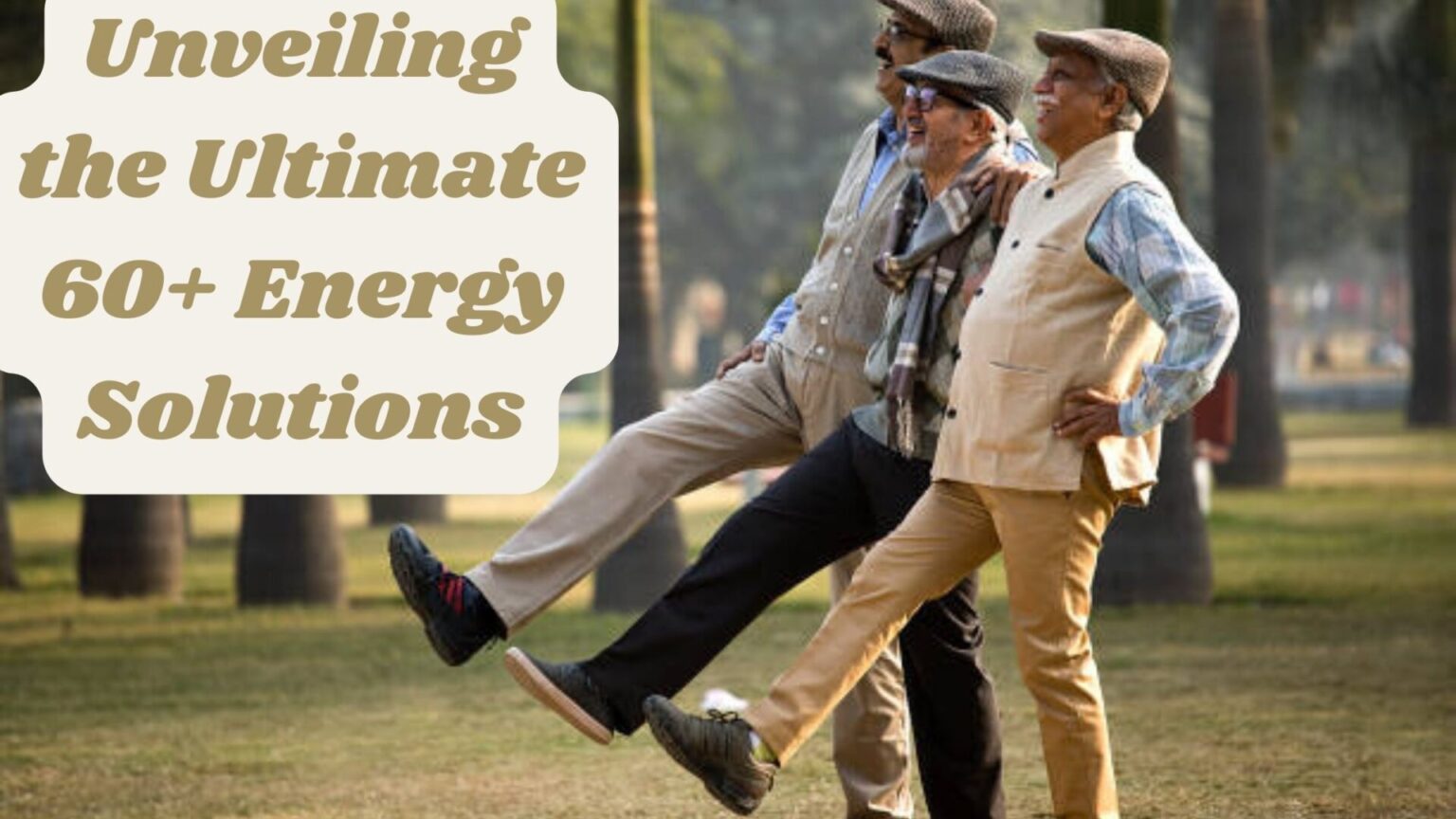Introduction:
“Unveiling the Ultimate 60+ Energy Solutions: A Guide to Boosting Vitality”

As we age, maintaining optimal energy levels becomes increasingly essential for a fulfilling and active lifestyle. If you’re 60 or above, you know the importance of finding reliable solutions to boost your energy. In this article, we’ll explore and discover the ultimate 60+ energy solutions through a curated list of products designed to invigorate your body and mind.
The Ultimate 60+ Energy Solutions
- Start Your Day Right with Nutrient-Rich Supplements: Kickstart your mornings with targeted supplements designed to support overall well-being. Explore the world of multivitamins and energy-boosting supplements to provide your body with the essential nutrients it needs.
- Embrace the Power of Superfoods: Discover the natural goodness of superfoods known for their energy-boosting properties. From antioxidant-rich berries to energy-packed nuts, incorporating these superfoods into your diet can make a significant difference.
- Stay Hydrated with Electrolyte-Infused Beverages: Dehydration can zap your energy levels, especially as you age. Explore electrolyte-infused beverages that not only keep you hydrated but also replenish essential minerals to support energy production.
- Invest in Comfortable and Supportive Footwear: Believe it or not, the right footwear can impact your energy levels. Invest in comfortable and supportive shoes designed for seniors, ensuring that each step is a comfortable and energizing experience.
- Revitalize with Gentle Exercise Equipment: Discover low-impact exercise equipment tailored for seniors. From stationary bikes to resistance bands, incorporating gentle exercises into your routine can boost circulation and energy levels without straining your body.
- Prioritize Quality Sleep with Sleep Aids: Quality sleep is paramount for sustained energy. Explore sleep aids and comfortable bedding options to ensure you get the restorative rest your body needs.
- Engage Your Mind with Brain-Boosting Games: Mental stimulation is a key component of overall energy. Explore brain-boosting games and activities that keep your mind sharp and engaged.
- Relax and Unwind with Stress-Relief Products: Chronic stress can deplete your energy levels. Invest in stress-relief products such as aromatherapy, meditation aids, or soothing teas to create a calming environment.
- Explore Technology for Health Monitoring: Stay on top of your health with technology. From smartwatches to health monitoring apps, these tools can help you track and manage your energy levels, ensuring you stay in peak condition.
- Connect with Like-Minded Individuals: Social connection plays a crucial role in overall well-being. Explore community groups, both online and offline, where you can connect with individuals who share similar interests and goals, fostering a supportive environment for maintaining energy and vitality.
What supplements are good for energy over 60+?
It’s important to note that before adding any new supplements to your routine, especially if you’re over 60, you should consult with a healthcare professional to ensure they are safe and appropriate for your individual health needs. That being said, here are some supplements that are commonly associated with supporting energy levels, particularly for individuals over 60:

- B Vitamins:
- B12: Essential for nerve function and energy metabolism. As people age, absorption of B12 from food may decrease, making supplementation beneficial.
- Coenzyme Q10 (CoQ10):
- A natural antioxidant that plays a crucial role in the production of energy within cells. CoQ10 levels tend to decline with age, and supplementation may support energy production.
- Iron (if deficient):
- Iron is essential for carrying oxygen to cells, and a deficiency can lead to fatigue. However, it’s important to note that iron supplements should only be taken if there is a confirmed deficiency, as too much iron can be harmful.
- Vitamin D:
- Important for bone health and overall well-being. Vitamin D deficiency has been linked to fatigue, and supplementation may be necessary, especially for individuals with limited sun exposure.
- Magnesium:
- Plays a role in energy production and muscle function. Aging individuals may be at risk of magnesium deficiency, and supplementation can help address this.
- Omega-3 Fatty Acids:
- Found in fish oil, omega-3 fatty acids support heart health and may help combat inflammation, contributing to improved energy levels.
- Carnitine:
- A compound involved in the production of energy. While the body can produce carnitine, supplementation may be considered, especially for those with certain health conditions.
- Ginseng:
- An adaptogenic herb that has been traditionally used to combat fatigue and increase energy levels. It may also help with stress management.
- Rhodiola Rosea:
- Another adaptogenic herb that may help reduce fatigue and improve overall energy levels, particularly during times of stress.
- Creatine:
- While often associated with athletic performance, creatine also plays a role in cellular energy production. Some studies suggest it may benefit cognitive function and overall energy levels, especially in older adults.
Remember, individual needs can vary, and it’s crucial to consult with a healthcare professional to determine the appropriate dosage and suitability of these supplements for your specific health conditions and concerns. Additionally, obtaining nutrients from a well-balanced diet is generally the preferred approach whenever possible.
What should be the diet of people aged 60+?
A well-balanced and nutrient-rich diet is crucial for individuals of all ages, including those aged 60 and above. As people age, certain nutritional needs may change, and it becomes essential to focus on maintaining overall health, managing weight, and addressing specific health concerns. Here are some general dietary recommendations for people aged 60 and above:

- Adequate Protein Intake:
- Protein is essential for maintaining muscle mass, bone health, and overall body function. Include sources of lean protein such as poultry, fish, eggs, dairy, legumes, and plant-based proteins in your diet.
- Fruits and Vegetables:
- Aim for a variety of colorful fruits and vegetables to ensure a diverse range of vitamins, minerals, and antioxidants. These can support immune function and overall health.
- Whole Grains:
- Choose whole grains over refined grains for better fiber, vitamins, and minerals. Options like brown rice, quinoa, whole wheat, and oats provide sustained energy and support digestive health.
- Healthy Fats:
- Include sources of healthy fats, such as avocados, nuts, seeds, and olive oil. These fats support heart health and may have anti-inflammatory benefits.
- Calcium and Vitamin D:
- Adequate calcium and vitamin D are crucial for bone health, especially as bone density tends to decrease with age. Include dairy products, fortified plant-based milk, leafy greens, and fatty fish in your diet.
- Fiber-Rich Foods:
- Fiber aids digestion and helps manage cholesterol levels. Include high-fiber foods like whole grains, fruits, vegetables, legumes, and nuts.
- Hydration:
- Stay well-hydrated by drinking water throughout the day. Older adults may be more prone to dehydration, so it’s essential to pay attention to fluid intake.
- Limit Processed Foods and Added Sugars:
- Minimize the intake of processed and sugary foods, as they can contribute to weight gain and negatively impact overall health.
- Portion Control:
- Be mindful of portion sizes to avoid overeating. As metabolism may slow with age, adjusting portion sizes can help manage weight.
- Regular Meals with Balanced Snacks:
- Aim for regular, balanced meals, and include healthy snacks if needed. This can help stabilize blood sugar levels and maintain energy throughout the day.
- Omega-3 Fatty Acids:
- Incorporate sources of omega-3 fatty acids, such as fatty fish (salmon, mackerel), flaxseeds, chia seeds, and walnuts. Omega-3s support heart and brain health.
- Limit Sodium Intake:
- Reduce sodium intake to help manage blood pressure. Be cautious with processed and restaurant foods, as they often contain high levels of sodium.
Conclusion:
Embrace the journey of discovering the ultimate 60+ energy solutions with these carefully curated products. By incorporating these into your daily routine, you’ll be well on your way to enjoying a vibrant and energized life.
FAQs:
1. What is “Unveiling the Ultimate 60+ Energy Solutions”?
“Unveiling the Ultimate 60+ Energy Solutions” is a comprehensive guidebook or resource that showcases over 60 innovative and sustainable solutions for addressing energy challenges. These solutions span various sectors, including renewable energy, energy efficiency, and emerging technologies.
2. Who is the target audience for this resource?
The target audience includes policymakers, industry professionals, researchers, students, and anyone interested in learning about cutting-edge energy solutions and technologies.
3. How were the 60+ energy solutions selected?
The solutions were carefully curated based on their potential impact, innovation, scalability, and sustainability. They represent a diverse range of approaches to tackling energy issues, from solar and wind power to energy storage, smart grids, and beyond.
4. Can these solutions be implemented globally?
Yes, many of the solutions featured in “Unveiling the Ultimate 60+ Energy Solutions” are applicable on a global scale. While some may require adaptation to local contexts, the principles behind these innovations are often transferable and can be tailored to fit different regions and needs.
5. Are there case studies or examples provided for each solution?
Yes, the resource includes case studies and examples to illustrate real-world applications of the featured energy solutions. These examples offer insights into successful implementations, challenges faced, and lessons learned.
References:
- International Energy Agency (IEA) – The IEA provides insights and data on global energy trends and innovations.
- Renewable Energy World – A leading source of news and information on renewable energy technologies and developments.
- National Renewable Energy Laboratory (NREL) – NREL conducts research and development in renewable energy and energy efficiency.
- World Energy Council (WEC) – The WEC publishes reports and resources on energy challenges and solutions worldwide.
- International Energy Agency (IEA) – The IEA provides insights and data on global energy trends and innovations.
- Renewable Energy World – A leading source of news and information on renewable energy technologies and developments.
- National Renewable Energy Laboratory (NREL) – NREL conducts research and development in renewable energy and energy efficiency.
- World Energy Council (WEC) – The WEC publishes reports and resources on energy challenges and solutions worldwide.






